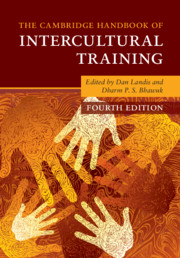Book contents
- The Cambridge Handbook of Intercultural Training
- Reviews
- The Cambridge Handbook of Intercultural Training
- Copyright page
- Dedication
- Frontispiece
- Contents
- Figures
- Tables
- Editors and Contributors
- Foreword
- Preface
- 1 Introduction and Theoretical Framework
- Part I Theoretical Foundations of Intercultural Training
- Part II Practice of Intercultural Training
- Part III Indigenous Psychology and Intercultural Training
- Part IV New Interdisciplinary Approaches to Intercultural Training
- 20 Cultural Neuroscience Basis of Intercultural Training and Education
- 21 Perceptual Representation
- 22 Emotional Contagion, Intimate Intercultural Relationships, and Intercultural Training
- 23 Dialogue and Culture
- 24 Optimizing Globalization through “Intelligent Swarming”
- Part V Summing Up
- Index
- References
24 - Optimizing Globalization through “Intelligent Swarming”
Suggested Activities for Training
from Part IV - New Interdisciplinary Approaches to Intercultural Training
Published online by Cambridge University Press: 18 September 2020
- The Cambridge Handbook of Intercultural Training
- Reviews
- The Cambridge Handbook of Intercultural Training
- Copyright page
- Dedication
- Frontispiece
- Contents
- Figures
- Tables
- Editors and Contributors
- Foreword
- Preface
- 1 Introduction and Theoretical Framework
- Part I Theoretical Foundations of Intercultural Training
- Part II Practice of Intercultural Training
- Part III Indigenous Psychology and Intercultural Training
- Part IV New Interdisciplinary Approaches to Intercultural Training
- 20 Cultural Neuroscience Basis of Intercultural Training and Education
- 21 Perceptual Representation
- 22 Emotional Contagion, Intimate Intercultural Relationships, and Intercultural Training
- 23 Dialogue and Culture
- 24 Optimizing Globalization through “Intelligent Swarming”
- Part V Summing Up
- Index
- References
Summary
This chapter proposes that globalization of multinational enterprises (MNEs) can be viewed as involving self-organizing swarms searching for optimal solutions to challenges presented by new and rapidly changing organizational ecologies. These challenges include developing innovative strategies for leadership, communication, training, management style, organizational design, and so forth. In this model, optimization most effectively occurs through evolutionary performance-based processes rather than more rational, analytic ones. This chapter applies recent theory and research on swarm intelligence to globalization, relates it to work on building microcultures in MNEs and suggests that the combination of these two processes can lead to more “intelligent swarming.” The latter involves a more detailed description of the past solution attempts of one’s own work team and those of other potentially comparable teams, including a fuller explication of key ecological characteristics, identification of potentially relevant comparison ecologies, and accurate evaluation of solution outcomes. It also involves better data storage and retrieval.Conditions which nurture intelligent swarming are discussed. Two training activities that have been used in a variety of organizational contexts and adaptable to enhancing intelligent swarming are described – “World Café” and “Smart Swarming.”
Keywords
- Type
- Chapter
- Information
- The Cambridge Handbook of Intercultural Training , pp. 680 - 700Publisher: Cambridge University PressPrint publication year: 2020

